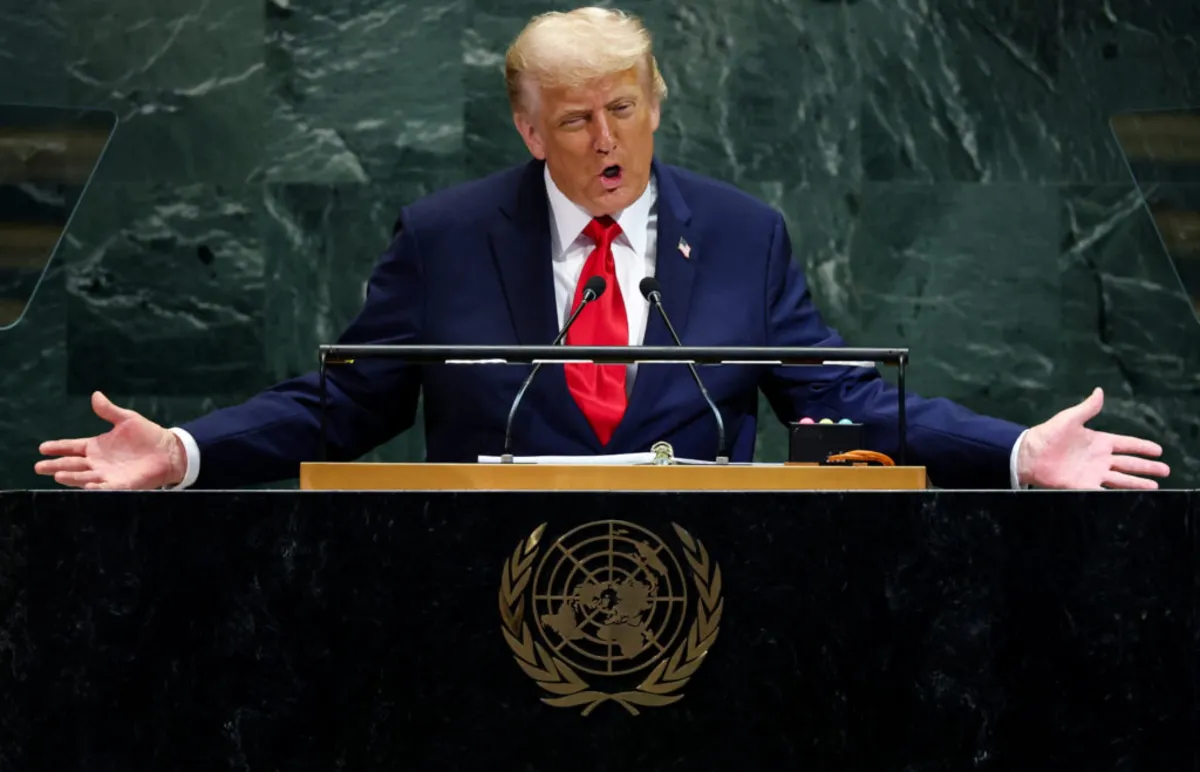
Since his return to the Oval Office, former President Donald Trump has significantly scaled back U.S. support for the United Nations (U.N.). This includes a controversial decision to withdraw the United States from the U.N. Human Rights Council once again and to cut funding for crucial programs, such as the United Nations Relief and Works Agency (UNRWA), which provides essential aid to Palestinian refugees. Most recently, the Trump administration announced that the U.S. would not participate in a U.N. review of its human rights record, further distancing itself from international oversight.
Early in his nearly hour-long remarks on Tuesday, Trump expressed strong criticism of the global body, stating that it is “not even coming close to living up” to its potential. He remarked, “All they seem to do is write a really strongly worded letter and then never follow that letter up.” According to Trump, “It’s empty words, and empty words don’t solve war. The only thing that solves war, and wars, is action.” His speech was characterized by several false claims and contradictions, raising questions about his stance on global peace and security.
Here are some notable highlights from Trump’s recent address at the U.N. General Assembly:
At the start of his speech, Trump faced a technical glitch with the teleprompter, humorously stating that whoever was operating it was “in big trouble.” He also took a jab at the U.N. for having a “bad escalator,” setting a light-hearted tone amidst serious discussions.
Trump boldly claimed that he has “ended seven wars,” asserting that he has played a pivotal role in settling global conflicts—contrasting his efforts with what he deemed as the U.N.’s “empty words.” However, his assertions about being a peacemaker are complicated by the fact that some of the conflicts he cited have not been wars or remain unresolved.
In response to recent formal recognitions of a Palestinian state by nations including Britain, Canada, Australia, Portugal, and France, Trump argued that such actions would only “encourage continued conflict” and serve as a “reward” for groups like Hamas, which were involved in the October 7 attack that escalated the ongoing war in Gaza.
Trump called on European nations to “step it up” in their efforts against Russia, warning that if the invasion of Ukraine continues, he would impose “a strong round of powerful tariffs.” He emphasized the need for Europe to halt imports of Russian oil, showcasing a tough stance on foreign policy.
During his address, Trump criticized various countries for their immigration policies, declaring that their approaches were leading to national decline. He reiterated his mass deportation agenda as a model for managing the “crisis of uncontrolled migration,” stating, “I’m really good at this stuff. Your countries are going to hell.”
Trump labeled climate change as “the greatest con job ever perpetrated on the world,” dismissing scientific predictions made by U.N. bodies. He criticized renewable energy projects, such as wind farms, and encouraged nations to purchase fossil fuels from the United States instead.
As is tradition, Brazilian President Luiz Inácio Lula da Silva opened the first day of speeches, emphasizing the crossroads of multilateralism. He warned against anti-democratic forces and the importance of cooperation. Trump, who spoke immediately after Lula, imposed a 50% tariff on many Brazilian goods, citing the prosecution of former Brazilian President Jair Bolsonaro as a reason. Despite his criticism of Brazil, Trump noted a brief cordial interaction with Lula, saying, “I saw him, he saw me, and we embraced.”
In summary, Trump's address at the U.N. highlighted his administration's ongoing shifts in policy and support for international organizations. His remarks sparked discussions on U.S. foreign policy, the role of the U.N., and the challenges of global governance in a rapidly changing world. For more in-depth coverage of the 2025 U.N. General Assembly, stay tuned to our updates.